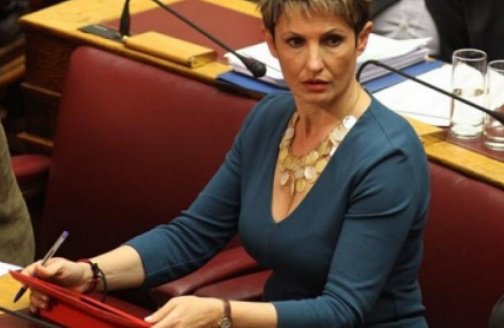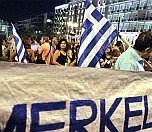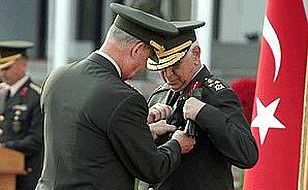Click to read the article in Turkish
Nilüfer Zengin, interviewed SYRIZA MP Anneta Kavvadia, Head of Greek Delegation and Vice President of the Parliamentary Assembly of the Council of Europe and also the Vice President of the European Affairs Committee of the Hellenic Parliament, ahead of two popular contests: European Parliament elections in two weeks, to be followed by local elections in September. Prime Minister Tsipras's party SYRIZA will stand the test of time believes an optimistic Kavvadia, who has left behind a brilliant journalistic career in order to fight for "another Europe".
* * *
NZ- Ascension of SYRIZA to power as the leader of ruling coalition in 2015 flowered a big joy and hope among all sections of European left. SYRIZA victory seemed as the historical convergence of the socialist movement with the demands of poor and exploited peoples of Greece. Neverthless SYRIZA in power was trapped between the popular demands for prosperity and the Troika's urge for immediate implementation of drastic austerity measures. Looking back, do you see that there was a third way out other than declaring moratorium and exiting the EU or conceding the Troika's conditions -that is was there in 2015 another way of defending the party and the people against the already corrupt political and economic system than the present government practices?
AK- The dramatic and historic period of the first 6 months of SYRIZA in government in 2015, culminating in July 2015, will always be remembered and studied, not just by the Greek Left, but I believe on a wider European level. For us who lived through those days, weeks and months it is a very vivid memory. We will never forget the passion, the determination to change things in Europe, but also the agony and the crucial dilemmas that we faced.
In July 2015 we were forced to make an extremely difficult choice for us, ideologically and politically. We realized that Europe was not ready to accept our legitimate, democratic and essential proposals and that austerity and neoliberalism were a cemented doctrine that went above and beyond any democratic legitimacy. What we experienced, as a party, as a nation and as individual politicians, can only be described as violent and brutal.
It was precisely this tremendous pressure, this blatant disregard of the democratically expressed will of an entire people by the EU power echelons, that led to the unforgettable world-wide reaction to what was happening, expressed through the slogan "This is a Coup". This phrase became the battle cry of an international movement of solidarity to the Greek people, a symbol of the democratic will of millions of European to stand up for democracy. This was what we faced and we made a choice.
We chose to not abandon the struggle, to not concede to those who regarded SYRIZA as a parenthesis, as a usurper of the "legitimate owners" of the country. We chose to make a tactical retreat, in order to love to fight another day, if I may use this "military" metaphor. Looking back, we can say today that we made the right choice, hard as it was back then.
In Europe left and popular demands from below is on the rise while ultra-right governments extend and reinforce their hold on power. In this context what is your expectation for SYRIZA's success in the European Parliament and local governmentelections in Greece. How would you read the results of these elections?
Ι have no doubt that the explanation provided by SYRIZA and by the European Left more widely on the roots and causes of the rise of far-right populism, nationalism and racism in Europe is historically accurate and politically correct. The neoliberal experimentations of the past two or three decades and the austerity doctrine that has been imposed upon the peoples of Europe have led to a deep social schism, vast inequalities, the loss of social cohesion and the breach of the social contract, upon which post-war Europe was built. The outcome was not inevitable, because nothing in history is.There are always alternatives, always.
However, the vested political and economic powers of Europe did not choose to follow the proposals of the European Left, of SYRIZA among others, and of all the democratic and progressive political and social forces of the continent. The consequence of these choices is a resurgent, new form of fascism.
Is it too late? As I said, history is about making choices. And there is a choice today: a pan-European coalition of those democratic and progressive forces, guided by the principles and the example of the democratic left, in order to create a common front against both neoliberalism and far-right populism.
Is it possible? Yes, it is. SYRIZA in Greece and the developments in Portugal and lately in Spain show us that it is. Such a coalition may prove more than victorious: it is essential for things to actually change in Europe.
Turkey was probably seconding Greece for the popular enthusiasm generated by SYRIZA's 2015 victory. HDP during its march for overcoming the national election barrier was deeply influenced from the SYRIZA'S pluralistic political style in synergizing the opposition of Kurds, Alevites, women, workers and ordinary people of motley backgrounds. What is your impression of the quality and nature of the relations between SYRIZA and Turkey's left and democratic forces?
For SYRIZA, HDP was never just a "pro-Kurdish" party. Rather, it was always, and still is, a party with deep roots in the tradition of the radical, democratic Left, a party struggling for social justice, gender equality, true democracy and human rights in a pluralistic, multi-cultural society of peace and prosperity. This vision is one that SYRIZA supports, not just for Turkey, but for all of Europe. That's why we always stood side by side with our Turkish and Kurdish comrades in their struggle for democracy. A struggle, which is also an inspiration for us. That's also why we observed with great anticipation the struggle of HDP to overcome the electoral threshold and we were enthusiastic with its success. Alongside our HDP comrades in the Parliamentary Assembly of the Council of Europe we continue to call for the ending of the undue legal, as well as political, persecution of so many HDP members, including Selahattin Demirtas, Figen Yüksekdağ and Ertuğrul Kürkçü. Therefore, our relations with HDP and with the democratic Turkish left in general are deep
rooted and continue to grow. We share a vision for our two peoples: a vision of peace, friendship, mutual respect and joint prosperity. In fact, this is the cornerstone of our policy in the wider region.
SYRIZA government faces a huge refugee problem particularly flowing from Syria and North Africa. What about Turks and Kurds? Has the number of Turks and Kurds seeking refugee in Greece grown or dropped down during Syriza rule? And what is the motivation behind the immigration from Turkey: political or other reasons? Is SYRIZA antcipating an upward swing in the number of refugees fleeing from Turkey?
It is true that since 2015 Greece has been facing a major humanitarian situation that cannot be described as a crisis, since it is not a temporary emergency but rather a much more long-term phenomenon. The vast majority of refugees and migrants reaching Greece are from Syria, Iraq, Afghanistan and Africa. However, there has also been a smaller but steady flow of Turkish citizens as well, both Turks and Kurds. This is documented in official records. As for the motivation, in most situations, asylum seekers state political reasons. Regarding how these claims are treated by the Greek authorities, as with all asylum seekers, they are examined on an individual basis, case by case, in accordance with international law and the European Convention on Human Rights. In the last couple of years or so, the flows from Turkey have been more or less stable. However, the situation remains highly volatile and we cannot be certain that unanticipated spikes in flows will not occur in the future -as, indeed, has happened in the past. This is the nature of the situation we are facing, given that millions of refugees still remain on Turkey. (NZ)










